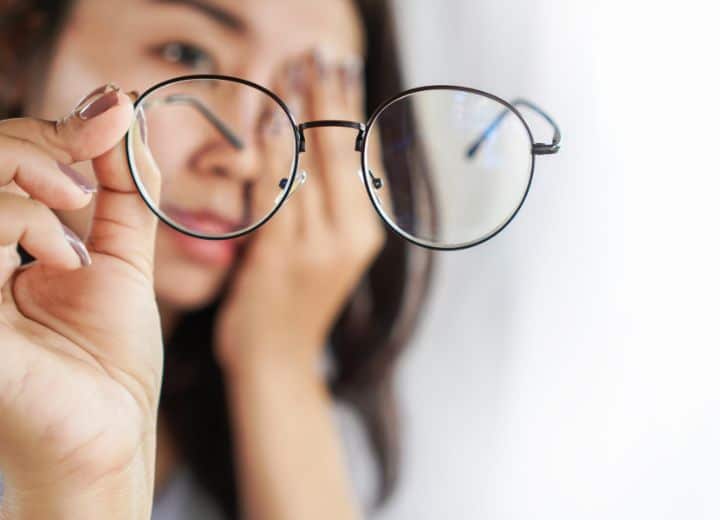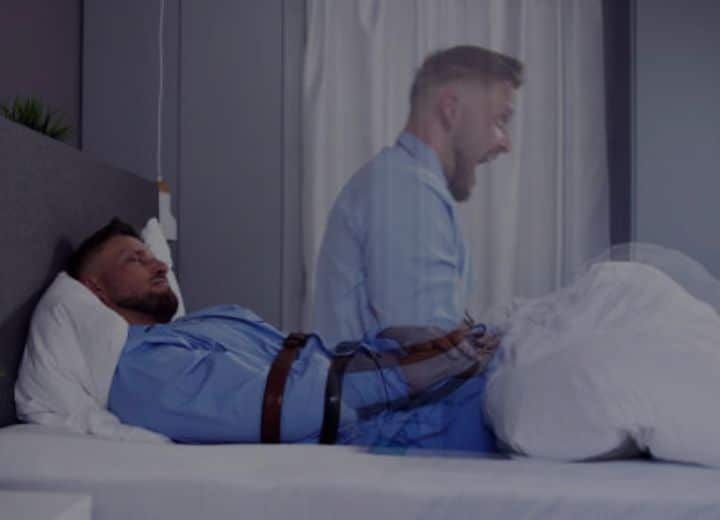What Is Blurred Vision? | Causes, Symptoms, Treatment
Blurred vision refers to a condition where objects appear unclear or out of focus, making it challenging to see details sharply. That affects one eye or both of the eyes and takes place gradually or maybe suddenly. Clear vision is essential for daily activities such as reading, driving, and navigating the world around us.
Causes of Blurred Vision
Refractive Errors
These are the most common causes of blurred vision. Refractive errors occur when the shape of the eye prevents light from focusing directly on the retina. The three main types of refractive errors are:
1. Myopia (Nearsightedness)
This occurs when the eyeball is too long or the cornea is too curved, causing light rays to focus in front of the retina instead of directly on it. This leads to difficulty seeing distant objects clearly while close objects appear sharp.
2. Hyperopia (Farsightedness)
Hyperopia results from the eyeball being too short or the cornea having too little curvature, causing light to focus behind the retina. Individuals with hyperopia typically have trouble seeing close objects clearly but may have better distance vision.
3. Astigmatism
This is caused by an irregularly shaped cornea or lens, that leads leading to blurred vision at all distances. It can occur alone or alongside myopia or hyperopia and often causes vision problems like double vision or ghosting.
Eye Conditions
Several eye conditions can also cause blurry vision, including:
4. Cataracts
Cataracts occur when the lens of the eye becomes cloudy, leading to blurry or dim vision, glare, and difficulty seeing at night. Age-related changes in the lens structure are the primary cause of cataracts, but factors such as genetics, UV exposure, and smoking can increase the risk.
5. Glaucoma
Glaucoma damages the optic nerve due to increased pressure within the eye, resulting in peripheral vision loss and eventually blurry vision. This condition often develops gradually and without symptoms until significant vision loss occurs, making regular eye exams crucial for early detection and treatment.
6. Macular Degeneration
Macular degeneration affects the macula, a small area in the retina responsible for central vision, leading to central vision loss and difficulty seeing fine details. Age-related macular degeneration (AMD) is the most common form and is often associated with aging, genetics, smoking, and UV exposure.
7. Diabetic Retinopathy
Diabetic retinopathy is a complication of diabetes that damages blood vessels in the retina, causing blurry or distorted vision. Poorly controlled blood sugar levels over time can lead to diabetic retinopathy, making diabetes management essential for preventing vision loss.
Other Factors
8. Eye Fatigue
Prolonged use of digital screens, reading in poor lighting, or driving long distances can strain the eyes and cause temporary blurred vision. Eye fatigue typically improves with rest and proper eye care but may indicate the need for prescription glasses or vision correction.
9. Dry Eyes
Insufficient tear production or poor tear quality can lead to dry eyes, causing discomfort, redness, and blurry vision. Environmental factors, certain medications, and underlying health conditions like autoimmune diseases can contribute to dry eye syndrome.
10. Eye Infections
Infections such as conjunctivitis (pink eye) or keratitis can cause inflammation and blurred vision until treated. Bacterial, viral, or fungal organisms can infect the eye through contact with contaminated surfaces or fluids, leading to symptoms like redness, discharge, and sensitivity to light.
Symptoms of Blurry Vision
- Blurred vision can manifest in various ways, including:
- Gradual or sudden onset of vision changes
- Difficulty focusing on objects
- Seeing halos or blurred edges around objects
- Eye strain, discomfort, or irritation
- Headaches, especially after prolonged visual tasks
Treatment for Blurred Vision
Corrective Lenses
Eyeglasses or contact lenses prescribed by an optometrist can compensate for refractive errors and improve vision clarity. Depending on the type and severity of the refractive error, different lens designs and materials may be recommended to achieve optimal visual correction.
Surgery
Procedures like LASIK or cataract surgery can correct vision problems and reduce dependency on glasses or contacts. LASIK (Laser-Assisted In Situ Keratomileusis) reshapes the cornea to improve focusing ability, while cataract surgery removes the cloudy lens and replaces it with an artificial intraocular lens (IOL).
Medications
Eye drops or oral medications may be prescribed to treat underlying conditions such as dry eyes or eye infections. Lubricating eye drops can alleviate dryness and discomfort, while antibiotics or antiviral drugs may be necessary to clear infections and reduce inflammation.
Lifestyle Changes
Adopting eye-friendly habits like taking breaks from screens, maintaining proper lighting, and staying hydrated can alleviate eye strain and prevent blurry vision. Adjusting the computer screen height and distance, practicing the 20-20-20 rule (taking a 20-second break every 20 minutes to look at something 20 feet away), and using artificial tears can help reduce digital eye strain.
Prevention of Blurred Vision
Regular Eye Exams
Routine eye exams can detect vision problems early and allow for timely intervention. Comprehensive eye exams assess visual acuity, eye health, and refractive status, helping to identify issues like refractive errors, cataracts, and glaucoma before they cause significant vision loss.
Proper Eyewear
Wearing prescription glasses or contacts as prescribed can optimize vision and prevent eye strain. Protective eyewear is also essential for activities like sports, and yard work.
Also Read: How to Fight Cortisol? |15 Ways To Reduce Stress
Frequently Asked Questions?
Can blurred vision signal a severe eye issue?
Yes, it can indicate conditions like cataracts, glaucoma, or diabetic retinopathy. Consulting an eye specialist is crucial for proper diagnosis and treatment.
Are there natural remedies for blurred vision?
While some claim effectiveness, it’s best to consult an eye specialist before trying any natural remedies.
Is occasional blurred vision normal?
Sometimes, persistent blurry vision warrants attention from an eye specialist.
Can glasses worsen blurred vision?
Properly prescribed glasses shouldn’t worsen vision. Consult an eye specialist if you experience discomfort or vision changes.
What factors increase blurred vision risk?
Age, family history, health conditions, screen use, lighting, and irritants can raise the risk. Understanding these helps in prevention.






